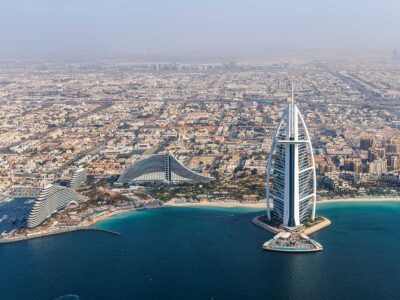The UAE and the wider Middle East region remain largely underserved when it comes to the sort of large-scale, all-inclusive resorts that are common in the Caribbean and elsewhere in the world, according to executives from Barcelo Hotel Group.
The group is the 29th largest hotel chain the world – as well as the third largest in Spain – and currently operates 247 hotels with over 53,000 rooms in 22 countries.
Of the total, three – Sharjah Grand, Barcelo Marina Residences and Dubai Occidental – are in the UAE, with another four in the pipeline slated to open in the next eight to 18 months.
Speaking to Arabian Business on the sidelines of Cityscape Global in Dubai, the CEO of Barcelo Gulf, Goulam Amarsy, said that the group sees significant opportunities in what he considers the underserved market for all-inclusive resorts.
“That is what will drive our growth in this region….our pipeline includes two big all-inclusive resorts in the UAE, and we are in talks for more all-inclusive resorts,” he said. “That is a segment that is not fully serviced here.”
Amarsy, who has previous experience working in Canada and Southeast Asia, compared the development of all-inclusive resorts in the MENA region to the early stages of the segment in the Caribbean.
“It reminds me of the Caribbean in the mid-1980s. There is a similar demographic, a similar need to develop certain countries and destinations, and similarities in terms of airlines and Open Skies policies,” he said. “People have the purchasing power and the time to take short, frequent holidays to different destinations.”
Barcelo Group’s CEO, Raul Gonzalez, said that the company believes that in this part of the world, the company can replicate the success of its larger properties in the Caribbean and Latin American destinations such as Mexico.
“The concept and the needs are very similar,” he said. “We just need to adapt the product to local reality. If we have a hotel in Dubai, we want a local touch.”
In particular, Amarsy said the UAE’s centralised location as a travel hub means that all-inclusive resorts in the country have large and varied potential source markets from other parts of the Arab world, South Asia, East Africa and the countries of the former Soviet Union.
“These populations are now traveling a lot and enjoying family holidays, meaning that they are our target market for the all-inclusives,” he said.
While he declined to give further details, Amarsy said that he sees “huge” potential for similar concepts in other GCC destinations, particularly Oman and, eventually, Saudi Arabia.
“Both the non-religious leisure and business [segments in Saudi Arabia] are of interest to us,” he said. “But even tourism in Makkah and Madinah is of interest. We know how to manage large-sized properties. In the Caribbean we have two or three properties in excess of 3,000 rooms. Madinah is exactly that.”







